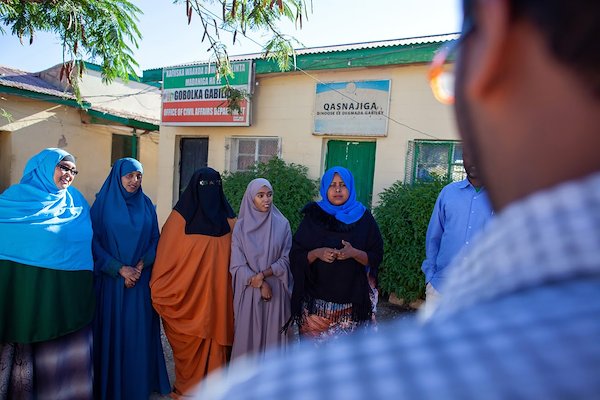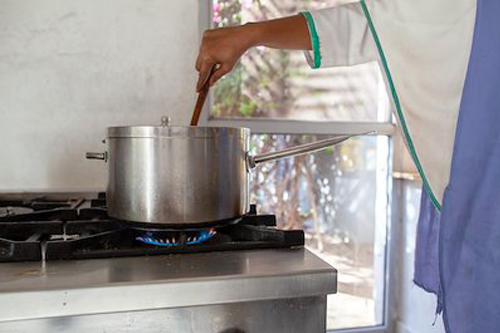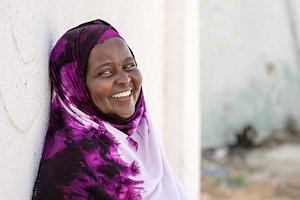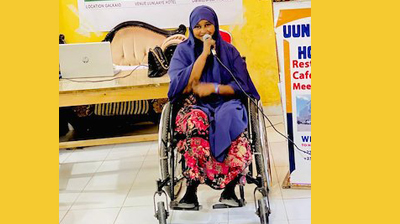Snapshot of key achievements through our programming and partnerships in Somalia since 2023
Towards a peaceful & resilient Somalia
September 7, 2024

After years of internal conflict, Somalia is now experiencing an upward economic trajectory while making incremental progress in peacebuilding and reconciliation fronts. Somalia's parliament earlier this year approved the revision of the first four chapters of the provisional Constitution, reaching a major milestone in the ongoing constitution building process. The HIPC completion and ensuing major debt relief granted to Somalia, it's entry into the East African Community as the eighth member at the end of 2023, and the gains made in stabilization and security sector reform indicate increased opportunities for the country's transformation. Despite these achievements, Somalia continues to face significant challenges across environmental, economic, political, security, societal, and human dimensions, highlighting the need for continued and focused efforts.
As a trusted partner, UNDP continues to provide crucial support designing and implementing integrated responses in collaboration with federal, state, and local governments, CSOs, the private sector, the UN system, and others. Outlined in its Country Programme, UNDP's focus has been in the areas of effective governance, inclusive politics and reconciliation; enhanced security, rule of law and access to justice; and sustainable management of natural resources for inclusive economic growth. Guided by the six signature solutions of the UNDP Strategic Plan, UNDP's programming in Somalia aligns with Somalia's National Development Plan and the UN Sustainable Development Cooperation Framework. Presented below are a selection of notable achievements achieved in the areas of our focus through our partnerships since 2023:

Promoting inclusive economic growth, livelihoods and job creation
In Somalia, over the last few years, internal conflict and climate-related emergencies have displaced over 2.6 million people. Most internally displaced persons (IDPs) live in unplanned and informal settlements in urban areas. This constitutes one of the highest IDP concentrations across the African continent.
In response, the Saameynta UN Joint Programme, implemented jointly by UNDP, UN-Habitat and IOM has been supporting the livelihoods of IDPs and host communities in three cities -- Baidoa, Beledweyne, and Bossaso -- across three Federal Member States (FMSs), namely South West, Hirshabelle and Puntland. This initiative aims to build community resilience, foster inclusive economic growth, and enhance livelihood opportunities.
In 2023 alone, over 1800 individuals, including IDPs, youth, women, and vulnerable groups, benefited from improved livelihoods and job creation. The program also provided entrepreneurship training to 500 youth, fostering economic empowerment and encouraging new business ventures in these cities.
Under another initiative funded by Somalia Joint Fund, and in partnership with the Puntland Member State, UNDP facilitated the transition of over 10,000 households to eco-friendly and sustainable energy sources, contributing to fulfilling their basic needs and also improving their family health and hygiene while reducing deforestation.
This initiative primarily targeted women-led households (95%) and involved adopting fuel-efficient stoves, alternatives to charcoal, and solar solutions. The transition, which also included installation of solar power systems in five hospitals, significantly reduced deforestation, improved operational capacity, reduced energy cost and charcoal consumption, while also creating new employment opportunities in the green energy sector.
UNDP's support to Somalia's data systems, tracking, monitoring and reporting has created a foundation for inclusive economic growth through development data sourcing and management. With the support of UNDP, the Ministry of Planning, Investment and Economic Development has designed and rolled out an SDG tracker to help monitor the progress across all SDGs. The tracker continues to inform policy making in Somalia today and will feed into the upcoming report in 2025. (Somalia's first Voluntary National Review Report 2022)
Similarly, in a historic shift in 2024, Somalia entered the global conversation on human development by securing a spot on the Human Development Index (HDI) for the first time in 30 years. This milestone signifies a promising new chapter in Somalia’s journey towards sustainable growth, driven by increased investment in human capital development and sustained international partnerships and strategic structural investments.
The country’s efforts to build a robust data system, led by the Somalia National Bureau of Statistics (SNBS) and supported by UNDP, promise a brighter future. This foundational work, including the Human Development Report (HDR) and the first report on Multidimensional Poverty Index (MPI), is expected to yield significant advancements in the coming years. The MPI report is expected to be launched in the last quarter of 2024.




Improving governance, access to justice and rule of law
UNDP has been instrumental in fostering collaboration between federal and state governments in Somalia, particularly in justice and correctional activities. UNDP is currently supporting the development of Somalia's first national Justice Sector Strategy following an innovative methodology that best fits Somalia's justice sector, which is a mix of multiple actors, with, at times, opposing interests and even values.
These actors range from "formal institutions, traditional and religious bodies both at the federal government (FGS) level as well as the federal member states (FMS) levels, each playing a role in delivering justice services but also creating a space for new ways of operating and providing people with a sense of safety, recognition and, well, justice". (Read this blog)
A successful strategy for the justice sector in Somalia can become an example for other ministries in the country, which is currently developing its first National Transformation Plan
The justice sector strategy is being developed as part of the UN Joint Justice and Corrections Programme (JJCP), which is funded by the European Union, implemented by UNDP, UN Mission in Somalia (UNSOM), and UNODC, under the leadership of Federal Government of Somalia Ministry of Justice and Constitutional Affairs and Federal Member States Ministries of Justice.
Establishing legal frameworks for policing at both state and community levels is another significant achievement. UNDP supported the development of State Police Acts, which professionalize law enforcement across federal member states in Somalia. Community policing policies have been introduced to promote cooperation between police and communities, enhancing trust and effectiveness in crime prevention and response. Complementing these efforts, a national training strategy for the Somali Police Force was developed, aimed at improving the capacity and professionalism of the force. This comprehensive strategy is crucial for addressing security challenges and ensuring the effective service delivery of law enforcement agencies.
UNDP's support for the indirect elections and voter registration initiatives in Puntland State, which saw over 340,000 Somali voters (49.7% women) registered, is a major achievement in enhancing democratic governance in Somalia. The increase in women's participation in local elections, from 11% to 17%, underscores the success of pre-election and advocacy training programs aimed at empowering women politically.



Building resilience to shocks and crises
UNDP has been working closely with the Federal Government of Somalia, all Federal Member States, the civil society organizations, the UN system and communities to strengthen resilience to a wide range of shocks and crises, including conflict, climate change, and disasters.
Walking alongside Somalia’s key partners and UN agencies, UNDP has been at the forefront of promoting state-building and reconciliation. In 2023, UNDP engaged over 192,000 women, youth, persons with disabilities, and IDPs in political processes, encouraging their active participation and ensuring their voices are heard in governance and decision-making. This engagement was part of a broader effort to support high-level political dialogue, promote peaceful transitions, and strengthen democratic processes.
Since June 2024, UNDP has been supporting Somalia's constitutional review process to help shape a robust federal system, effectively decentralizing state powers and services, and ensuring that all Somalis—especially women and youth—are actively involved in and benefit from transparent and accountable democratic systems at all government levels.
So far in 2024, seven public engagement and consultation sessions have been organized, focusing on chapters 5 – 9 of the Provisional Constitution. The views, opinions, and feedback of the participants have been compiled and will be considered in the amendments of the Provisional Constitution. These consultations were attended by various societal groups including women, youth, elders, academics, religious scholars, and representatives from government institutions. The consultations took place in several Federal Member States, including the Southwest, Hirshabelle, Jubaland, and the Banadir Regional Administration.
Earlier in 2023, the UNDP Reconciliation and Federalism Support Project (now State-building and Reconciliation Support Program) supported its Somali counterparts at the national and regional levels to partner with the traditional peacemaking authorities to resolve social disputes and save lives. The Project's support focused on enabling Federal Member States (FMSs) governments to find immediate and long-term solutions for communal conflicts exploiting the high potential of traditional authorities and structures to resolve disputes and sustain peace. Such include supporting regional governments to intervene in a timely manner whenever fighting erupts between clans and communities - these saved countless lives and livelihoods. Under this initiative, over half a dozen conflicts of different natures involving intra clan and inter clan disputes were successfully resolved and reconciled in Hirshabelle, Puntland, Galmudug states.
Notably, UNDP is supporting the establishment of the Somalia Conflict Navigator, which is expected to enhance the country's conflict management capabilities. This tool aims to provide comprehensive data and analytics to support conflict prevention and resolution strategies, ultimately contributing to stability and peacebuilding efforts across the nation.
On the disaster resilience front, UNDP has provided technical support to the Somalia Disaster Management Authority (SODMA) to conduct a government-led rapid Post Disaster Needs Assessment (PDNA) of the devastating and unprecedented 2023 Deyr floods in close partnership with the World Bank, the European Union, and other UN agencies. The R-PDNA report provides a comprehensive analysis that sheds light on the socioeconomic and environmental impacts of the worst flooding the country has seen in the past 100 years.
The findings and recommendations from the report are expected to inform key players about the disaster's reconstruction and recovery needs and encourage national and international response efforts to mobilize support for timely recovery.




Protecting the environment
UNDP has been proactive in promoting sustainable natural resource management and environmental conservation in Somalia. Through media campaigns, UNDP sensitized over 2 million people about the importance of sustainable practices, leading to a significant reduction in charcoal demand. This initiative was complemented by efforts to transition 5,000 households to alternative livelihoods, such as vegetable farming, beekeeping, and fodder production, thereby reducing dependency on unsustainable practices.
Improving access to water and promoting nature-based solutions has been another critical area of focus. UNDP facilitated the construction of medium-scale water infrastructures, providing over 21,300 women-headed households with reliable water sources and protecting livelihoods from drought and floods. Climate-smart water harvesting infrastructures, including wells, canals, and a water desalination plant, were strategically employed to adapt to climate change, benefiting 4,600 households. Additionally, the rehabilitation of over 6000 hectares of rangelands helped restore productivity and supported over 62,600 households, 52% of which were women-headed, in safeguarding local livelihoods.
UNDP's efforts also extended to policy development, supporting the drafting of key national policies, such as the National Climate Change Policy and National Environmental Strategy and Action Plan, to guide sustainable development and environmental management.
The Accelerator Lab team in partnership with GIZ Data lab developed a study combining big data and positive deviance to find rural communities who achieved resilience against droughts. The lab identified the best performing communities in terms of sustainable environmental protection and vegetation. This was followed by a joint experiment conducted between the best and worst drought-resilience performing communities to invite villagers to exchange local knowledge and practices so as to apply the differentiating adaptive strategies and thus transform their environment systemically. A scale-up plan was developed so clusters of communities can be experimented with to create impact on a wider geographic range. UNDP presented and disseminated the findings to relevant government organizations and other actors so that the finds could inform their policies and programmes.




Improving access to energy
Somalia does not have a national power grid and diesel generators are the primary source of electricity for the urban and semi-urban areas, while charcoal is still the main source of cooking in rural areas. The country lost nearly 30% of its forest cover between 1990 and 2020 as endemic trees were cut down and burned to produce charcoal, which is said to have contributed to worsening climate crisis and disasters, including droughts and floods.
As a response to this and several other interconnected challenges, UNDP has been promoting eco-friendly and sustainable energy solutions. In partnership with the Puntland State, UNDP helped over 10,000 households transition to eco-friendly energy sources, significantly reducing deforestation and charcoal consumption. This transition primarily involved women-led households and included the adoption of fuel-efficient stoves and solar solutions. The implementation of solar power systems in hospitals reduced energy costs and improved the operational capacity of these institutions, showing the benefits of sustainable energy solutions.
Moreover, UNDP's support for policy development in the energy sector has been crucial. It assisted in the development of the National Hydro-met Policy, ensuring its compliance with World Meteorological Organization standards. This policy, along with its implementation roadmap, is now available at the Ministry of Energy and Water Resources, providing a strategic framework for the country's energy and water resource management. These efforts are part of a broader initiative to enhance Somalia's capacity to manage its natural resources and respond to climate-related challenges, thereby improving the overall well-being of its population.
UNDP Somalia has mobilized and supported energy service providers in transitioning to hybrid diesel-solar minigrids, making solar energy more competitive and affordable. The focus remains on advancing digital technologies for clean energy and institutionalizing ongoing initiatives across the country.




Empowering women and youth, and Leaving No One Behind
Gender equality, social inclusion and women’s empowerment and the principle of Leaving No One Behind are at the heart of the 2030 Sustainable Development Agenda and cut across all UNDP’s programs, projects and initiatives. To ensure that our efforts are contributing to these overarching goals, UNDP Somalia developed and rolled out its country-level Gender Equality Strategy 2023-2026. In addition, this year UNDP Somalia was awarded the Silver Certification Gender Equality Seal for Development (2021-2023 round).
UNDP pursues gender mainstreaming across all signature solutions of the Strategic Plan.
In early 2024, UNDP’s Accelerator Lab implemented an innovative pilot on the inclusion of persons with disabilities (PWDs) in Puntland after several consultations with government representatives, NGO’s, the National Disability Agency (NDA), the PWDs and organizations serving PWDs. The best approach was to focus on Organizations working with Persons with Disabilities (OPDs) and building their functionality from the ground up. Through a series of workshops on finance, advocacy, organizational science and resource mobilization, followed by a four-day intensive media capacity building exercise on building sensitivity on PWD, the OPD teams were then given grants to implement disability inclusion projects in their localities.
In addition, UNDP, in partnership of NDA, launched a new project – Capacity Development and Empowerment for Persons with Disabilities Project in Somalia – with the funding support from the King Salman Humanitarian Aid and Relief Centre (KSrelief). The project works closely with NDA to provide much-needed technical, logistical and policy support to advancing the rights of the PWDs in Somalia.
UNDP recognizes the immense potential of young people as agents of positive change and supports governments, civil society, and youth-led networks. In this regard, UNDP’s Accelerator Lab has supported youth resource centers in Puntland by advancing youth learning in STEM through training and resources. Youth center managers from Badhan, Bossaso, Garowe, and Buhoodle received hands-on training and STEM kits, enabling them to pass on their knowledge and skills to other Somali youth. The program encouraged trainees to spread their learnings within their communities, creating a cascading effect to expand STEM education across different cities.






UNDP in its integrator role in Somalia

"Somalia has reached HIPC completion, joined the East African Community and is determined to break away from protracted crises and fragility. Somalia wants to transform, catch up with the rest of the world and aspire to become a prosperous and peaceful country. In order to achieve its ambitious and inspiring vision of the future, the country is determined to tackle root causes of long-standing issues, address structural and systemic challenges and to invest in resilient communities, systems and institutions."
"The Federal Government of Somalia recognizes that transformational change is underpinned by crucial political agreements on power and resource sharing, delivering basic services to all and strengthening the social contract with Somalis. Hence, Government has called for strengthened partnership to support its priority strategic endeavors and foundational statebuilding and development efforts focusing on a range of key sectors. As a trustworthy and long-standing development partner of Somalia, UNDP in its integrator role is leveraging its unique comparative advantage to support Government with these crucial priorities and ground-breaking aspirations. Guided by our Country Programme (2021-2025) and fully aligned with national priorities, the selection of results presented here illustrate some of our contributions in these key areas that are driving positive change across the country, leaving no one behind."
"On behalf of the UNDP Country Office, I extend my heartfelt thanks to all our partners for making these successes possible, including federal, state, and local governments, CSOs, communities, donors and cooperating partners and the wider UN family.”
– Lionel Laurens, Resident Representative, UNDP Somalia

The results presented here are from the projects (either solely implemented by UNDP or jointly implemented with other UN agencies) funded by Finland, Germany, Japan, King Salman Humanitarian Aid and Relief Center (KSrelief), the Netherlands, Norway, Republic of Korea, Sweden, Switzerland, the United Kingdom, European Union, Global Environment Facility (GEF), Green Climate Fund (GCF), UN Joint Somalia Fund, and UN Peacebuilding Fund.
Footnotes
This year-in-review is not an exhaustive list of all our results, but rather a snapshot of key achievements made under joint initiatives implemented with the Federal Government of Somalia and Federal Member States during 2023 and the first half of 2024 with funding from above-mentioned donors. Story text and graphics by Kamal Raj Sigdel & Ilyas Abukar, with contributions from all portfolios and projects within UNDP Somalia.

 Locations
Locations














